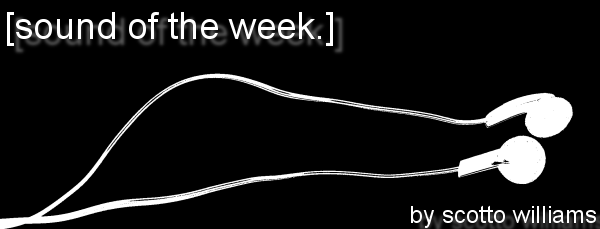 Say what you will about me as a reviewer, but I have a different perspective than most practiced music journalists. I can tell you that right now because most of the reviews for Broken Social Scene's Forgiveness Rock Record were really about their previous work, the generally-considered-masterpiece You Forgot It In People. Me? I haven't even heard You Forgot It In People. It predates my interest in current music and I haven't gotten around to it (although it's on the list.) So my opinion about Forgiveness Rock Record is just my opinion about Forgiveness Rock Record. And besides, I make it a policy to keep my remarks limited to the thing I'm actually reviewing, as much as possible. This wasn't even going to be a review, since the CD isn't new to me. But I'm also trying to get into filling this site out with retrospective reviews going forward, so I don't strain for content.
Say what you will about me as a reviewer, but I have a different perspective than most practiced music journalists. I can tell you that right now because most of the reviews for Broken Social Scene's Forgiveness Rock Record were really about their previous work, the generally-considered-masterpiece You Forgot It In People. Me? I haven't even heard You Forgot It In People. It predates my interest in current music and I haven't gotten around to it (although it's on the list.) So my opinion about Forgiveness Rock Record is just my opinion about Forgiveness Rock Record. And besides, I make it a policy to keep my remarks limited to the thing I'm actually reviewing, as much as possible. This wasn't even going to be a review, since the CD isn't new to me. But I'm also trying to get into filling this site out with retrospective reviews going forward, so I don't strain for content.It's actually hard to know what to make of this record. It's difficult music, but it's definitely music to my ears. It seems to be about everything: that is, it does not merely contain songs about everything (heartbreak, world-weariness, bitter parent-child relationships, primadonna actresses, oil spills, masturbation and yes, maybe even forgiveness,) but it is about everything. It's like a quilt made of patches: you can see all the little pieces strung together, but you can still pull it all over you.
The music itself is great because it just has this arresting "what next" quality that always seems to pay off. Sometimes it's buzzy and fussy and charging, like the aptly-named "Chase Scene" and the frantic "Forced to Love." Sometimes it's a shimmering dance ballad (such a thing is possible: just give a listen to Robyn's awesome "Dancing On My Own") like "All to All" or the reflective "Sentimental X's." Sometimes it's delicate yet powerful, like the horn-blasting "Art House Director" or the whirring drum-based "Ungrateful Little Father," which seems to take forever (in reality, a 3-minute ambient coda) to spin to its ultimate end, leaving issues unresolved (hey, just like real relationships.) And three times on the album, the group reaches for the epic and succeeds.
The first is the opening track, "World Sick." The second is "Meet Me In The Basement," an instrumental that says more with a few flourishes of guitars and strings than most lyrics do. The last is the climactic "Water in Hell," which does indeed flow like rapids through the underworld, and treats us to an amazing refrain (From what I can tell/ There's water in hell!) that somehow seems to sum the album up nicely, offering sweet release from otherwise eternal pain. It's joyous in its way, and the album seems to bridge between pleasure and suffering.
"World Sick," though: what an opener. At nearly 7 minutes, it's the longest thing here; even with its coda, "Ungrateful Little Father" doesn't sustain itself as long. And yet it never feels like it's going into "Hey Jude" territory (and I love "Hey Jude.") It rises and falls like any great rock song of its type, but it does so at a natural, leisurely pace: the writers of a song like this aren't desperate for pop simplicity, but more on that later.
I've heard it described as a reach for the stadium, but I think that's an oversimplification. The sound here is too nuanced to have been designed for that stage, despite the fact that it would fill it as well as any Kurt Cobain quiet-loud experiment. There's a meticulousness to the verses, the way it seems to plink along and bubble just under the vocals, rising just in time for the (yes) anthemic chorus. And those instrumental breaks are nothing to sneeze at. But listen again when he sings "I get world sick / every time I take a stand" and the audio track seems to fall like the embers of fireworks. That's not merely stadium rock. That's music that sounds like itself. It evokes something in me: that weariness but need to keep moving. I get world sick, everything's falling down, I want to give up but I can't let myself.
I don't talk a lot about lyrics lately. Albums like these tend to push vocals down in the mix and they become so underprivileged as to be unimportant to my enjoyment of the record. I mean, I can't understand half of what Joe Strummer sings on London Calling, but it's still one of my favourite records of all time. So I don't "know" what half or more of the songs on this one are about. I know what they make me feel. Well, I don't "know," since it's music and I can't put my finger on it, but I feel like I feel it.
Several of the reviews I read also tried to frame the content of the album in terms of its title. "Forgiveness, what could it mean?" Titles are important -- EVERYTHING ABOUT AN ALBUM IS IMPORTANT -- but I'm more interested in those other words. "Rock Record." Here's an album that needs to tell us in definite terms that it is rock, and that it is a record (that is, a definite whole, archaic as that term seems to people, I still call them records because they're recorded.) Calling this piece "rock" seems about as simplistic as calling London Calling "punk," but both cases are an exercise in mind expansion for those of us obsessed with labels. It's so hard to put your finger on this album, so why not just call it rock? Here's a statement about what "rock" can be in the 21st century.
If I have a problem with the album, it's that I find myself looking at the edges of the quilt too much during songs (to resurrect a lame metaphor from earlier in the review,) thinking about how it is made and fits together. But even though I mostly listen to it in bits an pieces on random, the sequencing is terrific: in those moments when I let myself drift away, it's absolutely absorbing.
I slotted it in at #4 on my "Favourites of 2010" list. I'll be talking about some of the others in coming weeks. I just wanted a case to say: here's an album I liked, here's what I feel like when I listen to it.
Buy this album on iTunes now!

No comments:
Post a Comment